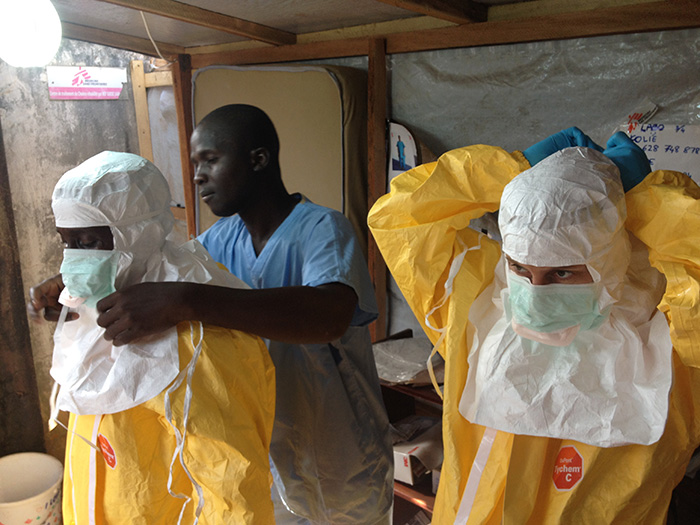ebola-team-c-european-commission-dg-echo.jpg

A medical team during the Ebola outbreak. Credit: European Commission
The fund said the growth rate of both west African nations is lower than was anticipated before the Ebola outbreak. In Guinea, the impact of this is substantial: growth averaged at 1.8% across 2012-15 and is expected to rise to 3.7% this year, compared with 7.6% growth predicted in 2012.
In Liberia, the story is similar. The IMF said there appears to have been no economic expansion at all last year, while growth is expected to stabilise at 6% in the medium-term – markedly lower than the 8% projected before.
However, the fund said that while some of this is due to Ebola legacies, it reflects the scaling back of investment and production plans in the mining sector as well as the impact of low commodity prices.
Revenues for this year’s budget have been revised down by more than three percentage points as donor support is expected to decline substantially and mining brings in weak revenues.
In Guinea too, tumbling prices have left fiscal and external buffers depleted. Political issues in both countries are also taking their toll, with uncertainty in Guinea and election-related costs in Liberia damaging the outlook.
While low commodity prices have affected exporters around the world, the Ebola epidemic hit Guinea and Liberia, as well as Sierra Leone, disproportionately.
The three countries bore the brunt of the epidemic. More than 11,000 people lost their lives and more than 28,000 were infected in these three countries alone.
The countries’ economies, health systems and social structures were devastated by the epidemic, which reversed years of development gains.
The World Bank estimates that the regional economic damage of the Ebola outbreak, which began in 2013, to have been $2.2bn over the next two years.
The fund said that despite this, Guinea has made significant progress since 2012. To ensure public finances remain on a sustainable footing, it recommended Guinea ensure new public financial management rules are strictly applied.
It highlighted the importance of controlling the wage bill and broadening the tax base, which it said would make room for public infrastructure projects and stronger social spending.
Guinea’s improved growth projections are based on the delivery of improved services, including electricity, health and education, as well as the expansion of agriculture.
In Liberia, the fund also welcomed measures to strengthen indirect taxes and address tax shortfalls, which it said will protect spending on Liberia’s most vulnerable and to promote the country’s development.
It warned however that risks are high, “particularly in light of the possible deeper-than-estimated second-round effects of the commodity price shock”.













